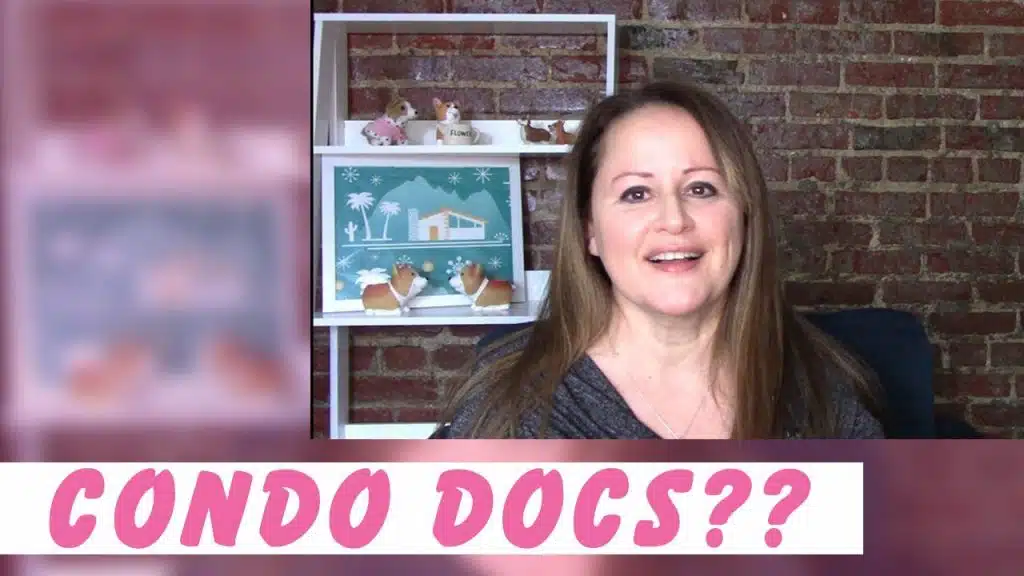Condo Documents
Condos are awesome. They can be an affordable way to become a homeowner without all of the nuisances that come with a house like maintaining a yard and shoveling snow from a driveway.
Condos are subject to a condo association which governs the community. If you are purchasing a condominium, you will be given an opportunity to review Condo Documents, often called “condo docs” or a “resale package.” This package of Condo Documents includes the rules and regulations for the condo, financial reports and hopefully, copies of recent board meeting notes. Also hopefully, this will be electronic and not hard copy. Because if it’s hard copy, get ready to build some muscles toting this thing home.
Once you get the Condo Cocuments, you will probably wonder “What should you I be looking for?” Read these documents and make sure that there are no restrictions on how you intend to use the property. Rules on pets, storage, rentals, parking, decoration of condos are some of the items you want to confirm make sense for your plans, as well as check their financial statements.
If you don’t feel comfortable reviewing these documents you can hire a lawyer do this for you.
There are penalties for non-compliance with condo rules, including the Condo Board being able to fine you and assess that fine against your “account.” And if you think you’ll just dodge the condo board by taking the back stairs, no one cares. The board can vote to levy the fine against your property. What does that mean? When you attempt to refinance or sell, it will come up on title if the lien was recorded.
How much time do you have to review these documents?
Condo Documents – Review Deadlines in the DC Area:
The amount of time you have to review the Condo Documents varies by state so make sure you know your deadlines.
- DC – 3 business days
- VA – 3 calendar days.
- MD – 7 calendar days for condos, 5 for HOA’s
A quick note about HOA’s vs condos. People often wonder what the difference is. HOA’s or Homeowner’s associations are made up of townhomes or single family homes where each home is legally subdivided on to its own lot. The owner also owns the land beneath their home. A condo isn’t like that. If you think of a high-rise condo, there’s no way to own the land beneath you since there are multiple condos over the same piece of land. So the land where the condo sits is one lot, and while legally each condo owns a small percentage of the land, it’s not really considered in that manner.
Back to the review periods. In this time period, you can ask any questions you may have, and you may also cancel the contract with no penalty to you.
Let’s dive deeper into each of the Condo Documents you will receive.
What are Condo Bylaws?
The Bylaws are usually very long, very boring and very boilerplate. The Bylaws discuss the operation of the condominium, the functions and responsibilities of the Board, how elections are handled, what constitutes a quota, as well as all other rules that govern the condominium.
Want to rent your place someday? Want to use beach towels as curtains that can be seen from the outside of the building? Want to paint your front door pink? The Bylaws will tell you if these things are allowed.
This document will also address “alterations to units,” meaning – renovations. Each condo may have different rules for what is allowed under the Bylaws. Most condos won’t allow your unlicensed Uncle Lou to rip out your kitchen. They will request plans, and a copy of the contractor’s license and insurance. In a homeowner’s association the renovations will be addressed in a separate document called Architectural Review. You won’t have to run renovations to the inside of your home by this committee, but anything on the outside of your home is subject to review. This is to preserve the look of the community, otherwise, next thing you know your neighbor is using toilets as planters.
The Bylaws cannot be easily changed once recorded in land records. Usually a 2/3 vote of all members and possibly 2/3 or more of the mortgage holders, i.e. the banks providing mortgages to unit owners, must agree. Why would the banks have to approve? Well, they have an interest in the condo and if a change is made to the Condo Documents and Bylaws that may reduce the value of the condo, they want to know about it. I’m sure you can imagine how difficult it is to locate the right person at every mortgage company for a vote on a change to something. It’s pretty close to impossible.
Let’s also talk about the aspect of Condo Documents being boilerplate. When a new community or association is created by a builder and developer, they hire an attorney to provide them with documents. They don’t reinvent the wheel here, they have a standard document they start working from. They route this for comments to the decision makers with the developer/builder. Those people are looking for anything in the documents that may impact their sales. So while the resulting condo documents will be mostly boilerplate, there are some specific nuances that may have been written for the community.
What’s in the Rules & Regulations?
The rules and regulations, sometimes called House Rules, are adopted by the Board as needed. This allows a condo board the flexibility to expand on things already outlined by the Bylaws. The House Rules cannot contradict the Bylaws, nor can they strike out anything already allowed or banned by the Bylaws. The Rules are strictly for working within what is set forth by the Bylaws and expanding on it or fine-tuning as needed. They Bylaws may allow for rentals of 50% of the units at a given time, but may not specify how that process will be managed. The Rules can expand on that if it’s first-come first-served, by waiting list or if there is a limit to the number of years a rental is allowed.
Reserves
There is no hard and fast rule for what should be in reserves. There is something called a “Reserve Study” where a company can tour the building, assess the systems and provide a report showing what the potential financial issues may be with corresponding replacement costs. This is sort of like a home inspection but for the whole building. It’s not something that is done regularly though.
The reason the reserves are important is because it’s really the savings account for the building. If there is not enough money in reserves to pay for repairs or upgrades in the condo common areas, the owners could be charged a special assessment to cover the shortfall to make up the difference.
Absent a reserve study, you will need to use your judgment. If a condo high rise with elevators, staff on site, a pool, fitness center and other amenities only has a few thousand dollars in reserves – this is a huge red flag. Similarly, a small building with a lower number of total condos and no staff or amenities shouldn’t need millions of dollars in reserves. That could indicate poor financial management or deferred maintenance.
Recently, Fannie Mae passed additional condo regulations in response to the Surfside collapse in Miami. If a buyer is putting less than 10% down, this triggers a “full review” of the condo association financials. The mortgage underwriter will require that the condo is putting at least 10% of their income toward reserves.
Financials
Included within the Condo Documents should be the “financials.” There should be a balance sheet and income statement as well as a budget with Year to Date information and any future approved budget if available. Many items may be contract services such as cleaning, landscaping and management. There will also be a section of “Repairs and Maintenance” and these are items that needed attention during the year that fell outside the scope of the vendor contracts. For example, if there is a monthly or quarterly elevator company on contract who comes to inspect the elevator on a regular basis, that’s great. But if the repairs and maintenance costs on the elevator are very high, it could indicate a problem. Either the elevator contract may not cover very much or the elevator has had a lot of service calls. Regardless, these are items to pay attention to.
You also want to see how many owners are delinquent on paying their monthly fees. This is also something the mortgage bank will want to know as well. If too many people are delinquent, it could be a red flag that money may fall short of being able to pay common area bills like electric, trash or water. If the building falls into a state of disrepair, owners could either face a special assessment or sell for a loss (short sale) or walk away from the condo entirely. The mortgage bank wants to do everything to ensure that this is a sound investment.
Insurance
There will be a master insurance policy included with the Condo Documents Resale Package. This policy covers the structure of the condominium so that if anything were to happen – fire, flood, earthquake, and the building had to be evacuated and fixed or rebuilt, the master insurance policy covers the replacement. It’s important to ensure there is adequate coverage on the building for replacement.
In the event you are displaced from the condo for any reason, your personal homeowner’s insurance will cover your per diem and a place to stay while the master policy insurance covers the rebuilding or repair of the building. The individual owner’s policy the buyer will obtain that is very similar to a renter’s policy. It should run about $300 / year, and will replace any damaged items, as well as potentially fully cover your stay in a hotel or other accommodation while the building is repaired.
Meeting Minutes
Depending on the jurisdiction and the condominium association and management company, there may or many not be meeting minutes included with the resale package. This is a good place to review the current issues the community is focused on as well as bring the buyer up to speed on any pending issues. This is also the place to look for mention of any special assessments since this can impact the monthly affordability for a buyer.
Fun fact – every condo, HOA and community has a resident wild card or two. Or five. If you read the minutes carefully, you can often find the place where questions from the owners are heard. If these questions and comments sound moderately or completely wacked, that’s pretty typical. Only you can decide if you can tolerate these people who may become your new neighbors.
Why may meeting minutes not be available? Condo Boards are made up of volunteers who are owners in the community just like you may become one day. It is their responsibility to appoint a secretary among the board and depending on that person’s time constraints, the minutes may or may not be written and approved for circulation.
Condo Document Conclusion
Once you receive the Condo Documents, three or five days hardly seems enough time to review everything. Once you ratify (both buyer and seller fully sign) the contract to purchase your condo, the seller can deliver the condo documents at any time. Be prepared to drop everything to fully review this package and definitely enlist help if needed. Don’t forget, you can run these documents by an attorney or financial advisor for their comments instead of slugging through them on your own.





